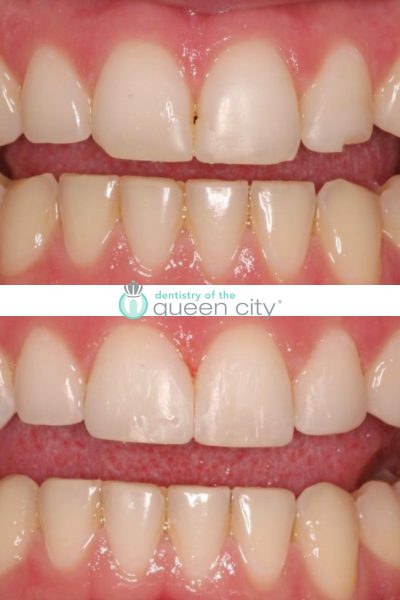Do you have a chipped tooth, cracked teeth, or a gap between your front teeth causing a lisp? Try teeth bonding for chipped teeth at our Charlotte, NC dental practice. A tooth bonding procedure is an economical and quick way to correct minor flaws in your teeth. We can correct flaws such as chipped or cracked teeth, stained teeth, gaps between teeth, and even a lisp.
We all know that our teeth are important, and that we need to take care of them. Dental bonding may be the best solution for you if you have a tooth that needs repair but does not require root canal therapy. Bonding is also an excellent way to cover up stains, gaps between teeth and other cosmetic flaws in your smile.
This procedure is especially popular among younger patients who do not want a permanent restoration. Tooth bonding is not permanent and our dentist can remove it if necessary. Whereas porcelain veneers are stronger and more permanent.
As a cosmetic dental procedure, it can serve as an economical transition to a more permanent option. Unlike composite veneers and dental crowns, you may need to get bonding treatment touchups every couple of years. Our team will help you keep your results looking as natural as possible.

Restore Your Confidence with Dental Bonding
Chipped teeth can be embarrassing and even painful. Finding the right treatment will help restore your confidence and improve the beauty and function of your natural smile. For many people, a dental bonding procedure is a reliable and affordable way to repair damaged teeth. Dental bonding is also one of the most common solutions for correcting a lisp because of misaligned front teeth.
Our dentist uses tooth bonding to address minor to moderate cosmetic dental concerns. Dental bonding can be a cost-effective alternative to dental veneers. The results are highly durable, natural-looking, and an effective option to address a wide range of dental concerns.
Our dental office provides tooth bonding procedures to fix many issues, such as:
- Close gaps between teeth
- Improve the look of crooked teeth
- Repair cracked teeth
- Repair chipped teeth
- Hide deep stains on teeth
- Fill dental cavities
- Repair worn-down teeth
- Fix misshapen teeth
- Make short teeth appear longer
- Change the shape and size of teeth
- Improve your confidence in your smile
- The composite resin can make discolored teeth appear whiter
Am I A Good Candidate for Tooth Bonding?
Tooth bonding is the best option for minor to moderate tooth damage. Patients who are not ready to commit to a permanent solution like dental veneers are good candidates for bonding. Dr. Reece may recommend dental crowns or a tooth extraction for patients who have severe cases of tooth damage.
This treatment is a relatively simple and affordable procedure that can help you restore your teeth. In order for you to be a good candidate for tooth bonding, you must not have gum disease, and tooth infections. Your oral health must be in good standing before our dentist can provide this service. We can address your oral health issues prior to treatment.
Prior to treatment, Dr. Reece will examine your teeth and gums, taking your budget, goals, and health into consideration. He may use digital imaging to accurately view the mouth to ensure that treatment is as accurate as possible. If you have tooth damage, call our Mallard Creek dental office in Charlotte, NC, at 704-486-8911.

Before and after composite bonding in Charlotte, NC.
The Teeth Bonding Process
Before the bonding procedure, Dr. Greg Reece will check your mouth and teeth to see if tooth bonding is right for you. He will also review your budget and cosmetic goals to inform you on possible treatments.
The treatment process begins when Dr. Reece removes a small portion of the tooth structure. This will ensure that the tooth bonding material properly adheres to the tooth, or teeth. In some cases, we will not need to remove any tooth enamel. He will match the color of the composite resin bonding material to your teeth to ensure natural-looking results.
Then, when the resin is ready, Dr. Reece will sculpt it directly onto the desired tooth. The resin material is pliable before it cures on the tooth. He will shape and mold it until it feels comfortable when biting down. Once ready, he will use a special UV light to harden and set the resin.
Dr. Reece will then polish the resin to complete the repair. After treatment, you should avoid teeth-staining foods and beverages for at least 48 hours. You can brush and floss your teeth normally after the procedure. Although you should avoid biting your nails or chewing on hard food objects following treatment.
Tooth Bonding FAQs
Learn more about tooth bonding in Charlotte, NC, with answers to these common questions:
How long does bonding last on a tooth?
Dental bonds typically last anywhere between 4-8 years. This varies based on the location of the bond, the care taken after the procedure, and your diet. Patients who tend to eat hard or chewy food find that this extra pressure can effect the lifespan of a bond.
In addition, the resin composite material that we use to bond teeth can last between 3 to 9 years. It may last longer with an excellent dental hygiene and care routine.
Can I get dental bonding on the front teeth?
Yes, our dentist can perform a tooth bonding treatment on your front teeth. Tooth bonding is a strong option for many tooth repairs. However, we do not recommend this treatment for major tooth problems.
Can I whiten tooth bonding?
No, your dentist can not whiten bonds that are already on your teeth. Color-matched dental bonding remains the same color as your tooth when you originally had the bond put in. If you whiten your teeth after getting a bond, keep in mind that the bond will not whiten with your natural teeth.
Is tooth bonding as strong as natural teeth?
Tooth bonding is strong, but don’t consider it indestructible. Just like your natural teeth, you need to take care of your bonding by avoiding bad oral habits. Do not chew on ice, or use your teeth to open plastic packages. You can damage your bonding by chewing on hard foods and ice, as well as using your teeth to open things with.
Is tooth bonding painful?
The process of tooth bonding is not painful. You will find that the procedure will alleviate any pain you had before it. You may notice some temporary tooth sensitivity after the procedure, but it goes away after your tooth adjusts.
Which is cheaper: veneers or bonding?
Bonding is cheaper than veneers. It offers a good option for small repairs, like fixing chips or gaps, and it’s also a quicker process. However, veneers are more durable, look more natural, and can last longer. Still, bonding does not require as much tooth preparation.
If you’re deciding between bonding and veneers, think about your budget, how long you want the results to last, and what kind of look you want. Our dentist can help you choose the best option for your smile and your wallet.
Does bonding look natural?
Yes, tooth bonding can look very natural! During the bonding process, the dentist uses a special tooth-colored resin that matches the shade of your natural teeth. The resin is carefully shaped and polished to blend in seamlessly with your smile.
A skilled dentist can make bonded teeth look just like the rest of your teeth, so most people won’t even notice the difference.
How much is tooth bonding?
The cost of tooth bonding can vary depending on how many teeth need treatment. If the bonding is being done for cosmetic reasons, like fixing a chipped tooth or improving your smile, insurance might not cover it. However, if bonding is needed to fill a cavity or repair a damaged tooth, your dental insurance may help with the cost. We will provide an estimate of your treatment cost beforehand.
Schedule A Dental Bonding Consultation
Our dental office can straighten, repair, and restore your crooked, damaged and chipped teeth with dental bonding. Call Dr. Reece and your team at Dentistry of the Queen City at 704-486-8911 for comfortable and thorough dental care in Mallard Creek.
You can also request a dental exam and consultation on our website. Dr. Reece and his professional team aim to provide high-quality dental bonding treatments to patients of all ages.
